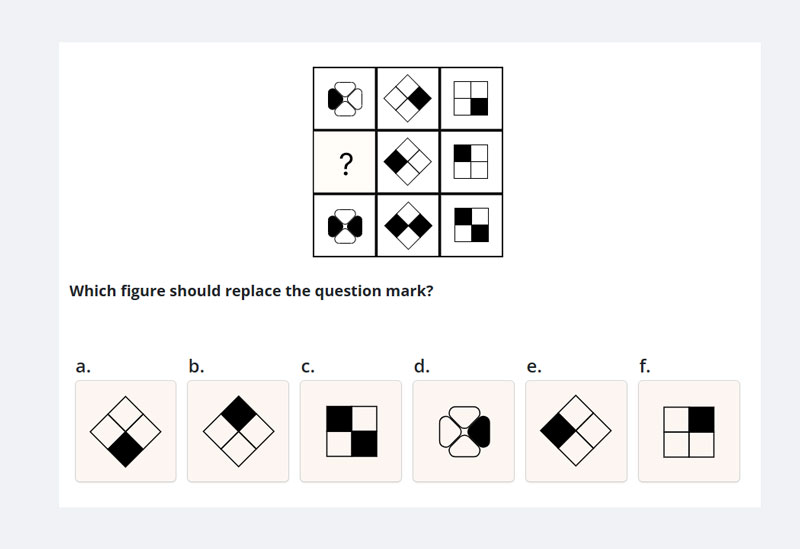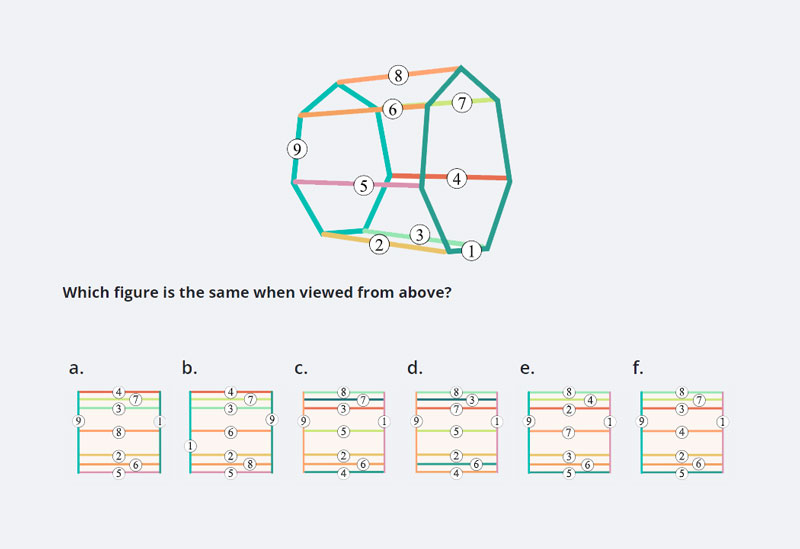
- IQ Test
- All Tests
- IQ Practice Test
- IQ Challenges
- Result Sample
IQ test questions cover a wide range of categories, each designed to gauge certain different cognitive abilities. Different IQ tests use various question types and scales to measure intelligence. For example, the Raven Progressive Matrices test consists of just non-verbal questions, while the Wechsler Adult Intelligence Scale (WAIS) has questions that assess a range of skills, like verbal comprehension, working memory, and more. Let’s explore the common types of questions you may encounter on an IQ test, how they evaluate different skills, and some corresponding example IQ test questions.
While IQ test question types are quite diverse, here are the 5 key types that often appear on many IQ tests:
Verbal comprehension questions assess an individual’s language understanding, vocabulary, and ability to process written information. This question type often involves analogies, synonyms, antonyms, and sentence completion. Performing well on these questions reflects strong verbal reasoning abilities and a solid grasp of the language.
Sample question:
"A cow has a calf, a horse has a ...". For this question, “foal” would be the right answer.
Logical reasoning questions are often one of the fundamental parts of IQ tests. They assess your ability to identify sequences, patterns, and logical relationships between elements. Commonly, you’ll likely encounter a series of shapes, letters, or numbers where you need to determine the next item in that series or sequence.
Generally, this IQ question type is essential for challenging the brain to think analytically and critically, highlighting analytical thinking and problem-solving skills.
Sample question:

Logic reasoning IQ test question from the Mensa IQ challenge
Spatial visualization questions challenge you to mentally manipulate or interpret objects in space. Tasks may involve understanding spatial relationships, rotating shapes, and solving puzzles like mazes or jigsaw problems.
For example, your task would be to complete the sequence by choosing the option representing the object as viewed from behind.
These IQ questions assess your capacity to understand and interpret spatial relationships effectively. They often require mental rotation, spatial awareness, and strong visual perception skills. They are designed to assess spatial intelligence, a critical ability for fields and professions like architecture, engineering, and design that rely heavily on visual and spatial reasoning.
Sample question:

Spatial visualization reasoning IQ test question
Memory questions test your ability to recall and process information. Tasks often involve recalling sequences of numbers or letters and reproducing them in reverse order. Such questions are essential for evaluating cognitive abilities like attention, focus, retention, and mental control.
Sample question: “Memorize this sequence: 5, 9, 2, 8. Repeat it backward.” The answer here would be: 8, 2, 9, 5.
Focus on mathematical and numerical abilities; these questions assess mathematical aptitude, problem-solving skills, and logical thinking involving numbers. You’ll likely encounter number series, algebraic equations, or mathematical puzzles. They test your ability to work with numbers, solve problems, and identify mathematical patterns. For example, your task for this question type would be to find the correct answer to “What is 25% of 200?” and the answer here is 50.
Another common sample is that you are asked to determine the next number in a sequence like "1, 4, 7, ..." In this example, the solution is "10," as the pattern adds 3 to each preceding number.
IQ tests are often a mix of different types of IQ questions, each assessing different skills and abilities. So, it’s important to familiarize yourself with various question formats.
To tackle them effectively, you need to understand the requirements clearly, recognize patterns or relationships and eliminate incorrect options to narrow down choices. When facing different question types, it’s also necessary to stay calm while focusing on each question and avoid rushing.
Additionally, practicing various question types may help improve cognitive flexibility, problem-solving abilities, and test-taking skills, leading to better performance on IQ tests.
Last but not least, it's perfectly normal to excel at certain question types while finding others more challenging. In fact, this can highlight potential areas for improvement, giving you a focus for further practice. So, see it as an opportunity to boost your IQ score and overall performance.
To conclude, IQ test questions are not just about math; they also measure a wide range of cognitive abilities, from verbal comprehension to logical reasoning, spatial visualization, and more. Understanding the types of questions on an IQ test helps you grasp its structure and purpose. It's also worth noting that while this post covers some of the most common question types, there may be additional variations depending on the test.